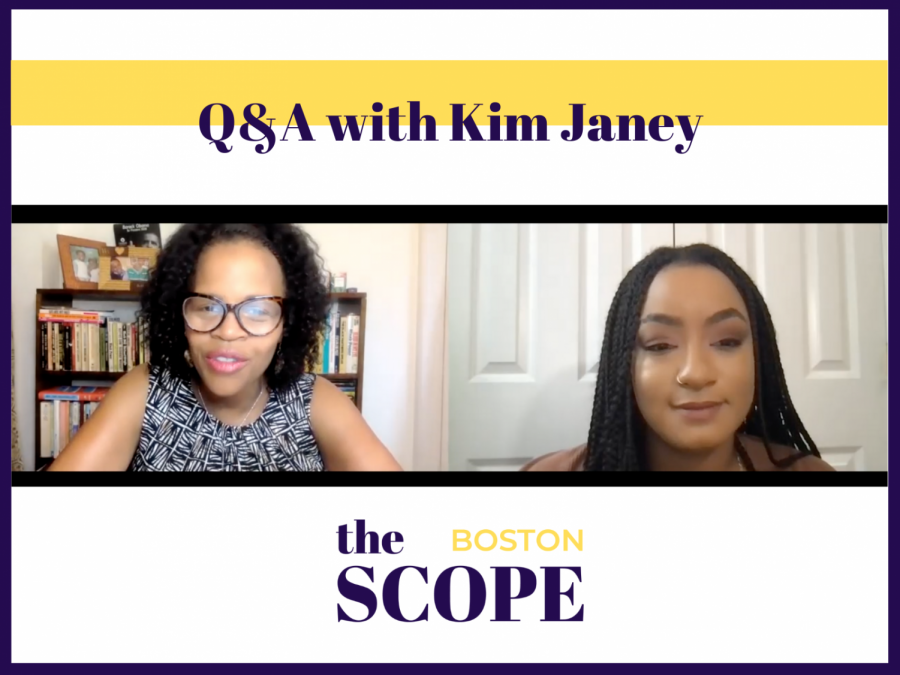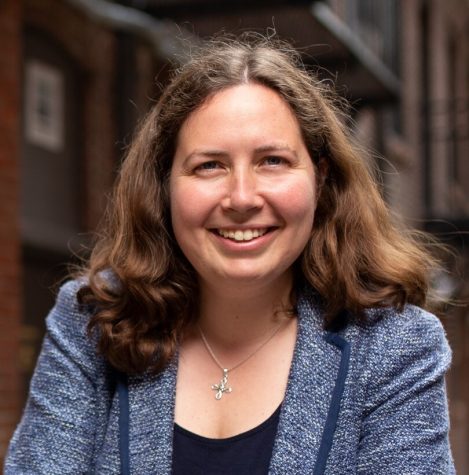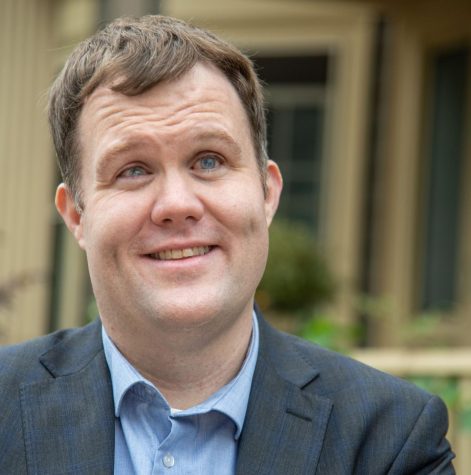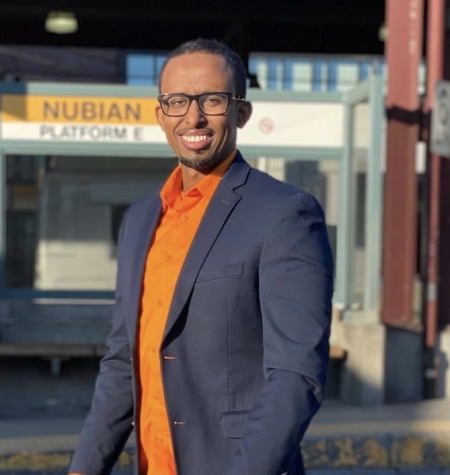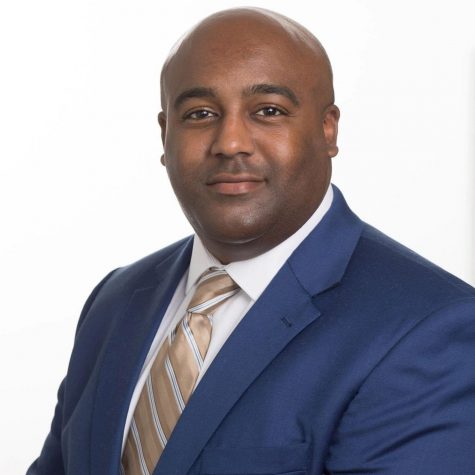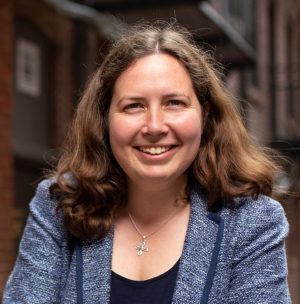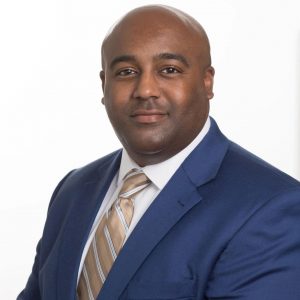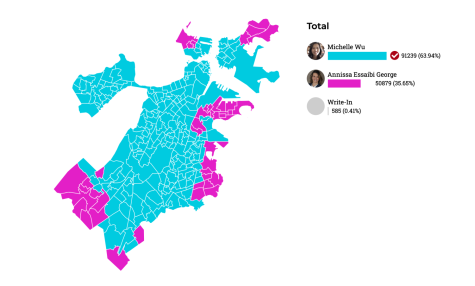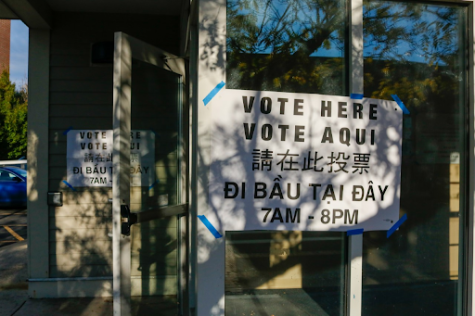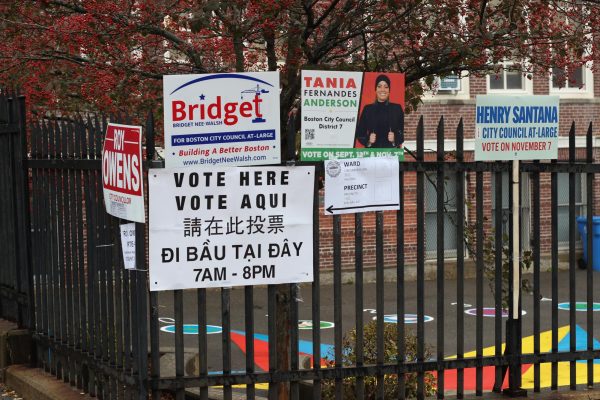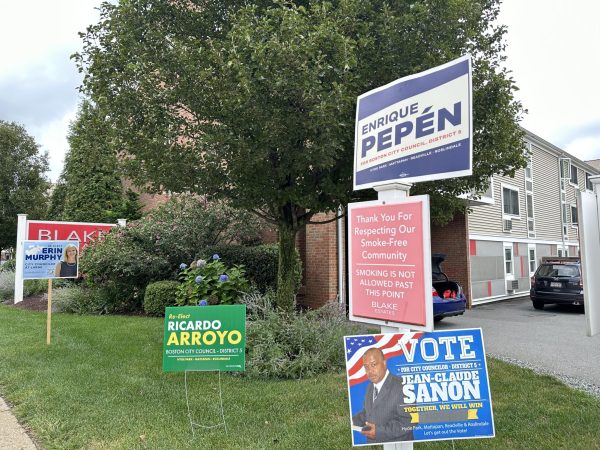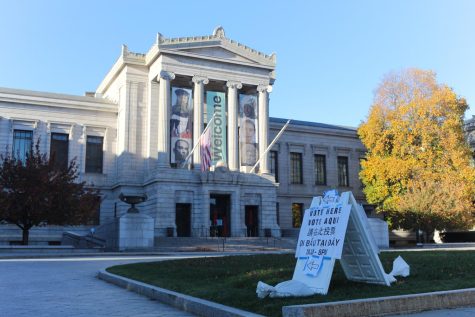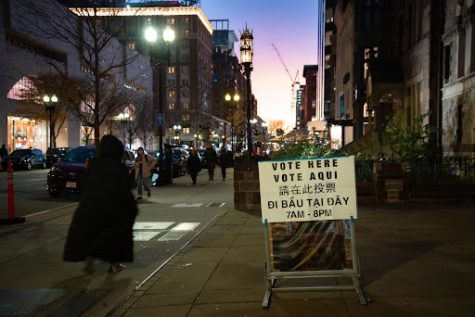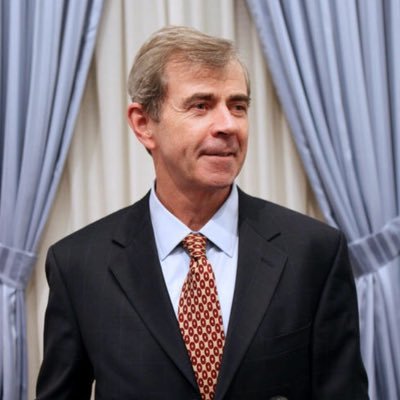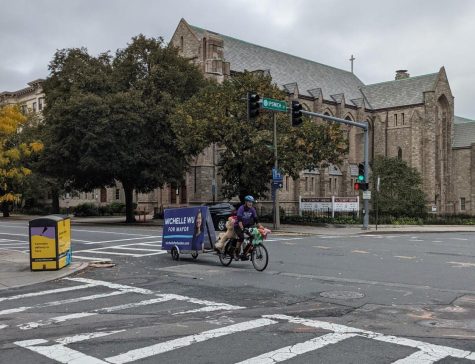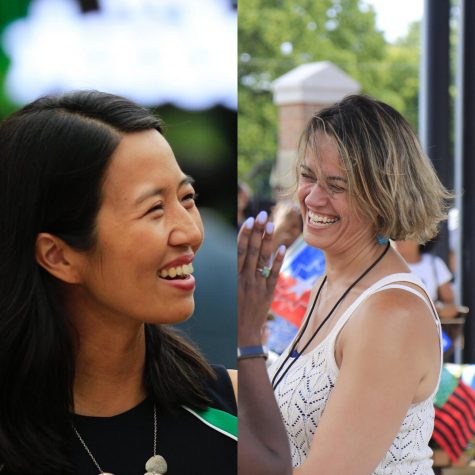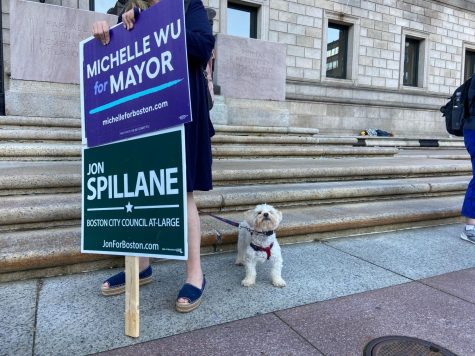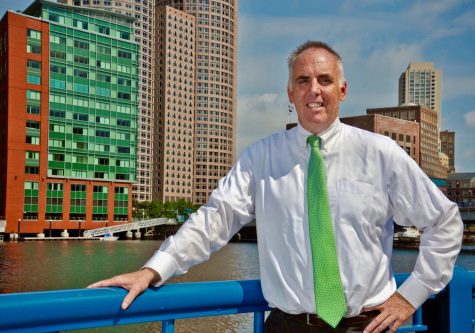Kim Janey talks mayoral campaign, BPS elected school committee and welcoming refugees
“For me, it is important that we bring everybody in. We are making sure that we take advantage of this opportunity to create a more equitable Boston for all of us.”
Kim Janey, the current Acting Mayor of Boston, is running for a full term as mayor.
Earlier this year, former Mayor Marty Walsh was tapped to serve in the Biden administration as Labor secretary, exposing an array of diverse candidates looking to take his seat.
Janey previously served as the president of City Council and the District 7 councilor. As the next in line, once Walsh left office, Janey became the first woman and first Black mayor of Boston and is now seeking to be the first to be elected to the position.
She is currently running against Michelle Wu, Andrea Campbell, Annissa Essaibi George and John Barros. Robert “Bob” Cappucci, a retired Boston Police Officer and Richard Spagnuolo are also running.
The Scope was able to sit down with Mayor Janey and learn more about her campaign and what she has accomplished so far as the Acting Mayor.
Full Video Translation
ESPAÑOL
CHINESE (Simplified)
CHINESE (Traditional)
TIẾNG VIỆT
English Transcription Below
Parts of this transcription have been edited for length and clarity
My name is Lex Weaver. I am the editor in chief for The Scope: Boston, a digital news site that tells the stories of justice, hope and resilience in the Greater Boston area. We practice journalism as an act of service, working to connect communities, form civic life, and amplify voices often overlooked or mischaracterized by traditional media. Today, we will be interviewing acting mayor and Boston mayoral candidate Kim Janey. Kim Janey has been on Boston City Council since 2017 as a District 7 Councilor and the first woman to serve as a Councilor for the District. Then in 2020, Janey became city council president. Earlier this year, after former mayor Marty Walsh was tapped to serve in the Biden administration, Janey became the first Black woman to become the Boston mayor.
Mayor Janey, it is an honor to speak with you today and learn more about your campaign. I know that we do not have a lot of time with you today, so I’m just going to go ahead and jump right into our questions that have been compiled together from Scope staff, as well as our readers.
One of the main questions that we always like to ask our candidates aside from what you have on your campaign website, can you tell us a little bit more about your background, and what really led you into the political sphere, and then also to do the work that you do today?
Thank you so much, Lex. And let me just say what an honor and privilege it is to be with you and all of your readers, listeners and viewers. I am born and raised in the city of Boston; I love my city with all of my heart. It has given me so much. As I sit before you as the first woman mayor of our city and the first Black mayor of Boston, and I bring to City Hall, I bring to this race a life experience that is like no other candidate in this race or any of my predecessors. I am thrilled to serve and lead my city at this time, particularly given the number of unprecedented challenges we face.
I grew up in Boston in the neighborhoods of Roxbury and the South End. [I am] the daughter of parents who came of age during the civil rights movement of the 1960s. As a large family of educators, artists, entrepreneurs and activists, I saw a lot growing up…all [of] the ways that my community was left out of opportunity. And I also saw the love the resilience of my community, how folks organized. And all of that influenced me, inspired me, and informs my thinking as I lead Boston through a lens of equity, hope, justice and love. And I love that those are your themes here; you know, justice, hope and resilience. It is so important. It is why I’ve launched a campaign around joy for city residents, given how much we’ve been through almost after a year and a half of COVID-19, and the disproportionate impact that has had on the Black community, on the Latino community, communities of color; needing for us to be really intentional about holding space for joy. That is a big part of what I am doing and how my policy is informed, you know, through this equity lens. And so it’s just a pleasure to be here.
Just really briefly… I went through Boston Public Schools, was bussed as a child [at] 11 years old, during the battle to desegregate BPS. My parents were very active. My parents were educators, always fighting for me, took the lessons that they instilled in me. [I] went on to high school through METCO (Metropolitan Council for Educational Opportunity) after being less than BPS. I had a daughter before I graduated. I was very determined to finish high school with my peers to graduate on time. And as a young single mom, I got my first apartment with a Section 8 voucher. I became a community organizer because I saw all the ways that my daughter’s life experience was very much connected to the life experience of other children.
Then, [I] dedicated my entire career to child advocacy and fighting for better education opportunities for children, which led me to then run for the Boston City Council, becoming the first woman to represent District 7; and now the first woman mayor and the first Black mayor of Boston.
I just got to give a shout-out because my father graduated from Northeastern [University]. He was a young student, scholar, athlete and activist. He and other students took over the president’s office. They demanded more Black studies [that] led to the creation of the African American Institute, which is now the John D. O’Bryant [African American] Institute. I definitely want to be thinking of him and center him in this conversation as he passed last year.
What have you accomplished so far in your time as the Acting Mayor? How congruent are these accomplishments to what you’re promoting on your campaign platform? And how would they reflect in your plans if elected?
Of course, I would lead with a global pandemic. Everything is really tied to the health and wellness of our residents. Coming into office, in the midst of a pandemic, that had to be the first priority; so getting the vaccine out and making sure that we were doing it in an equitable way because we already know that there was a disproportionate impact when it came to the Black and Latino community.
In my very first week, I launched a vaccine equity grant initiative—starting with $1.5 million—that we gave out to a number of community groups who had trusted relationships on the ground, meeting people where they are. I invested another $1.5 million into that grant initiative when I reopened the city, bringing that total to $3 million.
Now the focus is with our mass vaccination sites, our priority clinics, our community clinics, as well as our mobile vaccination clinics. Right now, our mobile vaccination clinics tend to be very key to our strategy of just meeting people where they are and getting the numbers up in terms of vaccines. I’m proud to say under my leadership as mayor of Boston, we have more than 68% of all Boston residents having at least one dose of the vaccine. We’ve seen, just in the last two weeks, an increase of 8,000 shots going into arms. And I mention that because of two things: one, very important with the Delta variant.
We know that there’s still some hesitancy out there, but we cannot play with this virus. It is very deadly, particularly for those who are unvaccinated and have complicated health issues. In particular, we know that there’s a life expectancy gap of 30 years for the Black community, depending on what zip code you live in. There are higher rates of diabetes, heart disease, asthma, etc. And so very [it is] important that we protect people with a life-saving vaccine.
In addition, I announced weeks ago, [a] mask mandate, as we bring our students back into school; a vaccine mandate for city employees. I have 18,000 employees that work for me. We took a very thoughtful worker-centered approach in that. Just yesterday, I announced a mask mandate for all spaces, indoor spaces that are open to the public. We have to do everything we can to slow the spread. I would also mention the increases we have seen in vaccinations of the Black community and the Latino community. I begin there because our health response is so tied to our economic recovery. It is tied to how we bring our children back to school. It is tied to how we get around our city. It is tied to everything that we do. And so, we must continue to lead. Under my leadership, Boston is one of the most vaccinated big cities in the country. That is the work that we’ve done on the ground.
In addition, housing we know was a crisis long before COVID-19. COVID only served to expose and exacerbate so many inequities, and so we focused on housing. The first week in office, $50 million in rental relief. We’ve also invested in homeownership. Everyone knows by now that there’s a racial wealth gap of a quarter of a million dollars in Boston. How we close that gap is through ownership, business ownership and homeownership. I have invested so that first-time homebuyers can get some assistance, moving that assistance from $10,000—which that’s what it was in the past—to now $40,000. That is important.
In terms of businesses, [we are] supporting our small businesses with $16 million going out to our small businesses and making sure that we continue to have the support, the technical assistance, particularly around outdoor dining. Before I got into office, we know that the city of Boston was spending $2.1 billion on goods and services and city contracts, tackling that issue as well. Investing in small businesses, particularly those owned by women and people of color,
Public transit, I don’t own a car. I have been a big proponent and advocate of reliable transportation, particularly buses. We know that Black people spend 64 more hours in their commutes than white folks in Boston. So, I launched a fare-free bus, the number 28. [The 28 bus route is along] a major economic corridor going down Blue Hill Avenue, connecting Mattapan Square, Grove Hall and Nubian Square; three neighborhoods with high poverty rates, Mattapan, Dorchester and Roxbury. So we are leading; when I say I am leading with an equity lens, [which] informs everything I do, that is what is happening on the ground.
Education was a big issue before I became an elected official—[I] continue to lead on that front; whether it be a new policy for how students are admitted to our exam schools and making sure that there is access and inclusion there, or just getting our kids back into the classroom safely. So many issues, and a lot of our issues that are at a crisis point. That is why this moment is so critically important.
And as a woman and as the first Black mayor, I’m making sure that we all have a seat at the table that we are all included. So that is the work that I am focused on. I’ve always been focused on that work as an organizer, an advocate [and] someone who has always led with the racial justice lens. That is the work that I continued on the City Council, [and that] I certainly continue as mayor of Boston.
I have one question for you, and I’ve seen it pop up several times online, and it’s been a concern for some of our readers… There have been many criticisms of you that you are hard to reach or disorganized in your approach. I’m wondering what your thoughts are on that, but also, how would you address these concerns if you continue in your position as an elected public official?
I hope your viewers understand [that] they cannot reach the mayor of Boston through social media. So, I am the mayor, and if they want to contact me, they have to contact me through my office. I’m not on social media to connect with residents. I am out in the neighborhoods every single day, meeting with residents all across our city.
If your viewers would like to be in touch, they should contact the Mayor’s Office. They can call my office. I’m going to give you the phone number right now… 617-635-3151. I’m also not on email. As the mayor of Boston, I am not on email. And so you want to contact my office, please do.
[I’m] very accessible. I’ve had several folks come into City Hall. I am planning an open house. I’ve activated the [City Hall] Plaza, even though it is under construction. We have live concerts there every Friday, food trucks that are coming. We are using every opportunity. Again, I have coffee hours that I’ve done just to make sure that I’m accessible in every neighborhood. We’ve activated these coffee hours in a way to bring joy, to bring hope to our communities, bringing in live artists, spoken word musicians, a DJ. There’s a Black woman who DJs every single coffee hour. And so I encourage folks to just contact my office, and they can contact the campaign.
If they want to catch me, they can catch me also at my campaign office, which is at 405 Center Street in Jamaica Plain. [I] certainly hope to catch folks at one of our coffee hours or one of our movie nights. We’ve also been doing many live concerts that are really important that we’re activating our open space and giving residents all across Boston the opportunity to connect.
If elected to a full term, how would you work in collaboration with the City Council?
Well, I come from the City Council, so I certainly understand the importance of our legislative branch. I’ve had great relationships with a number of the Councilors that I want to continue. We know that this election will bring a whole new slate of candidates. There are so many wonderful people that are running. I see them off and out on the campaign trail at a number of events. It’s been great to connect with them.
We certainly need to make sure that we continue to collaborate and work together in Boston’s residents’ best interest. And so that’s what we’ve done on a number of fronts; whether [it’s] the FY-22 budget, where we’ve got strategic investments in a number of areas, including how we police and we imagined policing. I know that is probably a big issue for folks who are watching today. And so I don’t know if you’re going to get to a question [about that], I’ll save some of that for later.
There are so many investments there; we’ve done that work together. [I] was very proud to have my first budget pass overwhelmingly with 10-2 vote; Unlike my predecessor, even before his first budget, after he was elected in office, had six months to work on a budget… and that was a 7-6 vote. I ascended to the mayor’s office, had only a few weeks and got a 10-2 vote. So, I’m really proud of the work that I’ve been able to do in office as mayor and the work that I’ve been able to do with the Boston City Council, which will certainly continue under my tenure as mayor of Boston.
I know you’ve answered this question a few times in the press before, but I wanted to ask it again. During the past year, members of the school committee were caught mocking people with Asian accents and disparaging white people from West Roxbury. That and other issues have led some people to call for a return of an elected school committee. What is your position on that?
Well, thank you so much. And to point out, that incident, that meeting… happened last fall, long before I was mayor. It was important for me to make sure that we have a school committee that has the trust of the people they serve. When I had the opportunity to appoint two new members, I made sure that there was representation.
There was a void in Latina leadership with members resigning, and I wanted to make sure that we were meeting and addressing that void. I appointed two stellar candidates who have strong roots in education and expertise in that field. Both of them are parents of Boston Public School students, which is very important. One of them grew up undocumented here in the city. That certainly informs her thinking. The other is the first school committee member whose primary language is not English. It is important that we support her success. She’s a parent organizer. And as we do that, we are pushing ourselves to do better to serve all of our families and students whose first language is not English. So, I’m really proud of those appointments.
I have been on record for a number of years now, saying that I am certainly open and interested in exploring a hybrid model of the Boston School Committee. Parents and other key stakeholders need to feel that there is a direct line of accountability to them with some elected seats if that’s the way we end up going.
Long before I became mayor in March, I’ve always said that there needs to be direct accountability to the mayor, especially given our budget. This is an overall city budget of $3.75 billion, with over a billion dollars going to our schools. When you appoint good people and have good people serve, families feel respected and represented. So, I was really proud of the appointments that I made earlier this year.
That kind of gets into one question that I had. Boston is such a diverse city. We do have many folks here who aren’t native English speakers or are undocumented and just go through many hardships, along with the Black and Latino communities. I know a significant portion of your platform does focus a lot on Black and Brown communities. I’m wondering if elected as mayor, what are your plans to access some of these other communities that aren’t necessarily highlighted as much on your platform, and how will you help them build up equity as well?
Well, I am mayor of all of Boston. I’ve been to every single neighborhood. I connect with residents of all backgrounds, all across our city. What we know in Boston, as it is majority people of color city—even with those numbers—many people are still left out of opportunity, don’t have access, are not at the table where decisions are being made [and] feel as if they don’t have power.
For me, it is important that we bring everybody in. We are making sure that we take advantage of this opportunity to create a more equitable Boston for all of us. A stronger Boston, a city that is more just and more resilient. We do that by working together across racial lines, language, linguistic, cultural, ethnicity, nationality, immigrant status, gender, and how people identify and who they love. All of everyone is welcome. We are stronger because of our diversity.
I have been intentional, with a focus on equity and lifting up those who have been left behind. It is important that we create a Boston where there’s shared prosperity. Where there’s [a] shared opportunity. Boston, I lead with how much I love my city. Boston is a great city, a world-class city, but it has not always worked for everyone.
For me, as mayor, it is important that we make sure that Boston is working for everyone. That everyone who wants to call Boston home can do so. That everyone has an opportunity for good jobs… to start a business, to buy a home, to be able to live in an apartment without worrying about being displaced, to be able to go to parks, to raise children, to have good careers, to not have to worry about gun violence; making sure that we’re addressing trauma in our neighborhoods, that people have access to good quality health care; that we’re closing and dealing with these inequities that have been with us for years, decades and centuries. It is important that we are intentional about that work and that we’re doing that work together. And that has been my focus as mayor.
I wanted to ask because I think it’s hard for anybody anywhere to ignore what’s going on in Afghanistan. I’m just curious to know what Boston’s plans are and if there’s a plan to implement any policy or take in any Afghan refugees?
I have joined with other mayors across the country for temporary protected status, not just for Afghanistan but also for Haiti. We know that there has been devastation with another earthquake [in Haiti], and certainly, this is right on the heels of the assassination of the President.
I’ve joined with other mayors to ask for and demand protected status for any folks who may find themselves, certainly here in our city, but on American shores, but certainly here in our city.
Since I know that we’re short on time, I just wanted to open up the floor to you. Is there anything about you or your campaign that you haven’t been asked before by the media?
Well, Lex, I want to make sure I take just an opportunity to thank you. You’ve had some excellent questions. And I know other folks have been submitting questions, so I thank you for the thoughtfulness. I thank you for the interest in how city government works and what it means to run for office.
I encourage everyone listening to take a look at my website mayorjaney.com and visit our campaign office at 405 Centre Street in Jamaica Plain. To be more active. I’ve always been a champion of our young people, not just K- 12 but our younger adults in their own activism. It has been young people who have always led, who have always been at the forefront of every movement. We’re talking about the civil rights movement. We’re talking about women’s rights; whatever the issue, young people have always lead the way. So I’m really grateful to everyone who may be listening and certainly encourage your continued engagement.
I’ve been very clear that this is our moment to make sure we’re doing everything, not just to lift up those who have been left behind, [but] to make sure we are creating a strong Boston. A stronger Boston than ever before. As mayor, I’m not trying to bring us back to normal when I know that normal is a racial wealth gap of a quarter of a million dollars, mass incarceration and a housing crisis and schools that don’t always work for all students. I want us to go better; we cannot go back. We need to go better. We have no other choice. We have to do that work together, bringing residents from all across our city together in a way to create a stronger Boston, in a Boston that’s more equitable, just and resilient.
It’s not just about election cycles. Yes, September 14 is very important. I hope to earn the votes of people who are watching here, and that they support their first woman mayor and that we do this work together. But it’s after the election. It’s after September 14, after November 2, that we have to continue to do this work. These inequities are years, decades and centuries in the making. To address them will take all of us working together. I certainly hope to earn your support, and I’m grateful for the opportunity to be with you.

